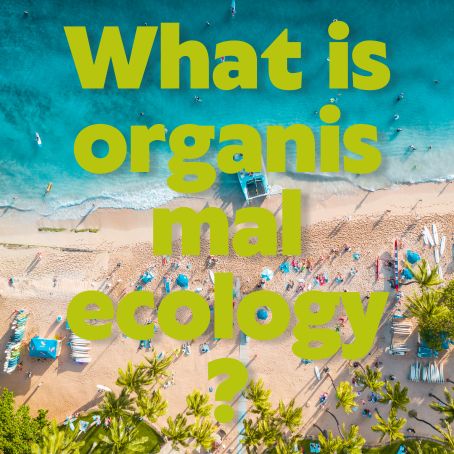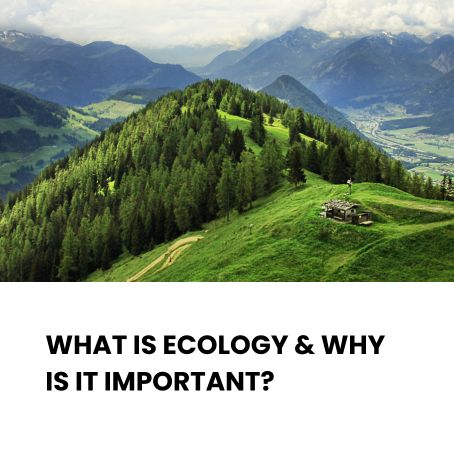Reasons for the Significance of Ecology
Language/Languages Anglicised terms related to the discourse of ecology
. In essence, ecology is the study of how living organisms interact with their environment and this inter-understanding includes groups of physically related organisms and all supporting entities in the ecosystem. It follows that ecology explains the area occupied by organisms, how many of the organisms are present, and how all the organisms behave in relation to the biotic and abiotic factors of the ecosystems.
Hence the discipline is so wide with vast scope that it covers all levels of the organization starting from organismal to population to community ecology which deals with different biological, ecological, and environmental phenomena. Such dynamics are important, in the sense that if they are understood well, it becomes possible to forecast changes in ecosystems, and, thus to put the necessary management steps for the sustainable use of natural resources in place. It is also the case with alterations in ecological workings and processes that affect biological diversity such as global warming and loss of habitat.
Core Organics of Ecology
Biodiversity Conservation
Eco Iziv: Endangered Species and Their Natural Habitat Do Not Disappear: Ecology is one of the essential biomes; it is the science of life that exists on Earth, and highlights the need of conserving the biological variety. Life forms with different functions are present in millions in each ecosystem. Ecologists by investigating and studying the interactions taking place in ecosystems are able to identify important areas within the ecosystems and watch out for endangered species and come up with appropriate protection strategies. This includes prevention of further human encroachment into some of the existing biological zones and reconstruction of zones previously occupied by humans.
Resource Management
Sustainable Use of Natural Resources: Any prudent resource economy must be based on the discipline of ecology. It also includes policies and actions that allow people to consume biological products such as water, soil, forests, and minerals without exhausting them. When ecologists comprehend these resources within systems, they possess the capability to provide guidance on environmentally sound and sustainable work methods as well as active land use planning and management.
Ecosystem Services: There are many services that ecosystems provide including water, pollinators, and climate, which enable and are beneficial for human beings. These are also the services that ecologists look to assess the value of and come up with ways of preventing them from degradation. For instance, wetlands act as natural filters which help in improving the quality of water while the forests serve as sinks for carbon dioxide hence help in fighting against global warming. All of these interplays must be known to obtain ideal ecosystem service provisioning for both humans as well as other species.
Focusing on Future Climate Change Scenarios and their Menace Mitigation Plans
Understanding Climate Systems: Man’s understanding of time as a dimension of existence has undergone a change, and for this reason, the concept of man’s thought as evolving must find a place in the political discourse around climate change. By applying the principles of ecology, scientists observe changes in the spatial distribution of species, their ecosystems, and the services they provide triggered by changing climate. For example, it will be temperature gain and some drift will be the greatest some species to shift to less warm environment or face competition and be preyed on in the same place.
Assisting the Natural Processes: The societal goals about transforming more aggressive environments into fertile areas that would serve as carbon sinks, sequestering stores and reducing the level of atmospheric greenhouse gas concentration are found in ecological theories. Such activities as rehabilitation of degraded land with the aim of reforesting it or rebuilding wetlands enhance ecological systems and provide protection for communities against the worst impacts of climate changes.
Human Health and Quality of Life in Respect of Human Domains
Ecoepidemiology: There is one aspect of ecology which is a disease cycle that is significant in analysing any existing ecological relations between humans and their environment. It removes the strict principles of contact and infection diseases such as malaria on how a given environment eventually results in or controls the increasing contacts of people with contact diseases. This means, for example, the more people go deeper into the forests, the more malaria there is, which in turn produces more COVID-19 virus infections. This knowledge concerning ecosystems is crucial in combating it or containing this and promoting health for the peoples.
Mental Health Benefits: Environmental conservation and ecological research offer a very important result—natural biodiversity improvement—for enhancing people’s mental health. Putting it another way, more ecologically valid environments create more leisure, more active people and stress reduction, hence improving the quality of life of the societies.
Global Change and Conservation Biology System
Ecosystem Dynamics and Global Change: Ecology is one of the key elements in this study as it concerns investigating the relationship between environmental change and ecosystems interaction; it stems from issues such as deforestation, pollution, invasive species expansion, and alteration of global temperatures. From this dynamics, the ecologist will be able to infer and develop models on the changes in ecosystems and how future changes will impact the ecosystems and what would be the implications of anthropogenic actions.
Conservation Strategies: In a similar manner, the ecologists carry out their strategies regarding protecting biological diversity and its ecosystem services within the context of global change. This entails the creation of national parks, migratory routes for certain species, and recovery of damaged ecosystems in order to keep the components and processes of the ecosystems functioning.
What is organismal ecology?

This subfield examines the anatomical, cognitive, and behavioural modifications that contribute to a better interrelation with the habitat. This domain aims to answer questions of how different aspects of organisms or offspring interact with different ecological variables. In a nutshell, this area of specialisation seeks to explain how individual organisms survive along with growth, reproduction and interaction with the organisms and surrounding environment.
Important Features of Organismal Ecology:
Physiological Ecology:
- Research of Adjustments: Organismal ecologists study how organisms cope with environmental pressures such as temperature, or even light which can sometimes hinder survival. This also includes studying biological mechanisms such as osmoregulation which help the reproduction of the organism in the designated area.
- Ecophysiology: This field of specialisation studies how certain conditions or climatic factors foster specific biological processes. For instance, there may be animals that live in extreme weather conditions, and the ecophysiology seeks to assist understand how those animals regulate their body temperature.
Morphological Ecology:
- Structural Adaptations: As this section of this subdiscipline examines the shapes and structures of organisms that have developed over time in order to promote efficiency and survival. These are such as the length of a giraffe’s neck which enables grazing of leaves from higher branches and the thick fur on arctic animals which acts as an insulator against the cold.
- Trade-offs: Morphological features are usually associated with trade-offs. For instance, increased body size may enable the individual to be more efficient in avoiding predation, but it might also involve increased energy costs.
- Behavioral Ecology:
- Study of Behaviour: This branch of organismal ecology assists in understanding how various behaviors impact the maintenance and reproduction of an organism. It studies behavior patterns such as hunting, breeding, defending territory, and social interaction and explains their variations in terms of biotic or abiotic factors.
- Adaptive Behaviour: For instance, some species of birds sing to defend their territorial domains or to entice mates, while some species of fishes are known to school together to evade attacks by predators.Ecological Niche:
- Role in Ecosystems: Organismal ecologists are also concerned in the concept of ecological niches which focuses on the functional characteristics of organisms in their environment and the resources they utilise. Such understanding includes the food, water, shelter and the mates that it requires to thrive.
- Niche Differentiation: They also investigate how the functional role of different species or individuals of the same species in the same ecosystem changes through spatial or temporal resource partitioning in order to limit competition for resources.
Ecosystem management and conservation start with an understanding of how the environment is approached by an organism individually or on a micro-level. This would also help in comprehending the spatial distribution of species along with their persistence in certain areas and the role they play within the ecosystem. This is essential information for conservation since it helps to plan how to protect species and manage their habitats appropriately

